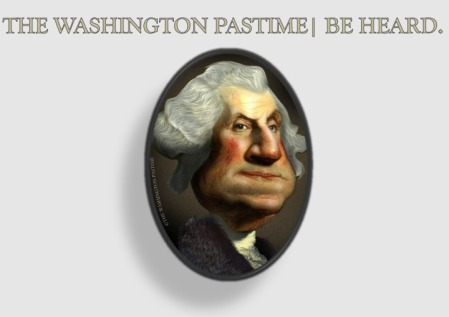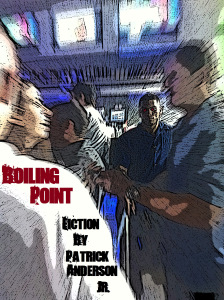If you truly love telling stories and entertaining others through the written word, then never stop writing, never stop studying the craft, never stop revising or submitting. Do not get discouraged.
 In November, 2011, The Washington Pastime had the privilege of publishing Patrick Anderson’s short story, Ace of Spades. Patrick has also been previously published in Prick of the Spindle, Silverthought, Existere Journal of Arts and Literature, Sex and Murder Magazine, Ghostlight Magazine, The Worcester Review, the horror anthology Touched By Darkness from Etopia Press, and writes for All Magazine, The Medulla Review, The Doctor T.J. Eckleburg Review, Midwest Literary Magazine, Bacopa Literary Review, and The Florida Review.
In November, 2011, The Washington Pastime had the privilege of publishing Patrick Anderson’s short story, Ace of Spades. Patrick has also been previously published in Prick of the Spindle, Silverthought, Existere Journal of Arts and Literature, Sex and Murder Magazine, Ghostlight Magazine, The Worcester Review, the horror anthology Touched By Darkness from Etopia Press, and writes for All Magazine, The Medulla Review, The Doctor T.J. Eckleburg Review, Midwest Literary Magazine, Bacopa Literary Review, and The Florida Review.
Now, in March 2013, Ace of Spades will be re-appearing as part of a short story collection, Boiling Points, which was released today in eBook and Print, available on Amazon, Barnes&Noble, and Smashwords.
Just in time for his publication, we caught up with Patrick as part of our Author Spotlight series.
It’s been almost a year and a half since “Ace of Spades” was published with us. What have you been doing in that time?
A lot, actually. I moved to New York for about nine months in October 2011, tried my hand at editing for a local magazine, living in the city and soaking in the history. Then I realized I missed the beach and my family and friends—which coincided with the teaching offer from Miami Dade College—so I moved back home. Been teaching there since last summer, and just trying to experience life to the fullest otherwise.
Writing-wise I’ve been working on various short stories. I’m also currently in the talks with an agent for my graduate thesis/first novel, Quarter Life Crisis, so hopefully that will be on bookshelves in the not-so-distant future. Other than that, I’m diving head-first into my second novel.
Does “Ace of Spades” feel like a long time ago, or is it still fresh? (Describe the creative process…eg. Does it feel like part of you, or separate when you re-read)
I actually vividly remember writing the first draft of “Ace of Spades”. It was a lot of fun actually, just an image that sort of grew into a scene, and then into a plot. It was one of those moments where I really remembered why I started writing in the first place, though the true motivation for editing it after the first draft was that I’d written it as an assignment for one of my MFA workshop courses.
I had been writing nothing but literary works for almost a year at that point, and I just wanted to try something more in line with what I grew up reading, the suspense/sci-fi/horror/thriller and general genre works that used to keep me up at night. The original title was actually “The Last Man Not on Earth”, and the day I brought it in for my classmates to read, it totally bombed. I mean…they hated it. Despised it. Ripped the entire thing apart from beginning to end, and then—when they were done—commenced ripping me a new asshole for even bringing it in to class in the first place.
It was one of many humbling writing experiences I’ve had over the years, helped with that rejection-numbness I think all writers develop over time. I loved the story so much though that I didn’t scrap it. Just let it sit for a while, picked it back up about a year later and identified what was really wrong with it (i.e. the technical aspects of living in a space station that I’d done absolutely no research on when I wrote the first draft, along with the fact that the story ended very differently in earlier drafts, less depressing and consequentially less realistic, if sci-fi can ever really be considered realistic), spent a few months trying to fix it, ran it by a few friends and waited for the second round of insults. The insults never came though. They loved it, so I sent it out. And here it is.
It was one of those moments where I really remembered why I started writing in the first place
Tell us about “Boiling Points.” Is there a specific theme, genre, or overriding tone to the stories?
Boiling Point is a compilation of ten stories I’ve written over the past five years or so, majority of which have been published in various online and print magazines. They range in subject matter and genre, from suspense to horror to drama to sci-fi, all with this darkly humorous tone I can’t seem to get rid of in my writing (starting to think I just might be that cynical).
The overarching theme of the collection is something I didn’t really notice I was exploring until I looked at the stories together; it concerns this human divide we’ve created as individuals and society as a whole, this forced annihilation of our inherent barbaric behavior in favor of more civilized conduct. Like, we try so hard to stay refined, especially those among us who consider ourselves educated. We debate, pontificate, and try to use logic as much as possible throughout everyday situations, trying so hard to keep control over what’s going on inside of us, sheltering our emotions away until they’re stacked in the garage of our minds like hostages. But eventually, everything always comes to light, it just depends on the person and what their trigger is. Boiling Point explores those breaking points in the context of the characters within each story and the situations they find themselves in (most of them so weird I kind of worry about myself sometimes).
Where did you come up with the inspiration for Ace of Spades, and how do you see it fitting in “Boiling Points”?
“Ace of Spades” was actually conceived during a…uh…”debate” between me and my girlfriend-at-the-time. We were outside smoking cigarettes (I’ve since quit) and sitting in chairs looking up at the sky and she made a comment about the stars, how beautiful they were, and how clear the night was, and how endless it all felt. Basic sentimental girlfriend/boyfriend conversational stuff. I, though—being in one of my more introspective and slightly gloomy moods—made a comment about how people always talked about the sky as if it was the most beautiful thing in the planet, not really taking into account that it would kill any one of us in a second if we suddenly found ourselves out there without any protection. I then segued into a discussion on how screwed up it would be if the astronauts in the space station up there suddenly found themselves stranded; say, after a nuclear war on earth, or an extinction-level meteor strike, etc. I regret the conversation now, since it killed the mood of the night and led to a pretty awkward sleeping situation. But I got the story out of it, so…I call it a win.
As far as how “Ace of Spades” fits into Boiling Point, the stories in Boiling Point all have a very distinctive line of rising tension that is released somehow by the end of the story when the main character allows their negative emotions to come through their façade of either contentment or nonchalance about their present-day lives. The narration of “Ace of Spades” jumps around from present to past throughout the story, slowly revealing the narrator’s true dilemma (which is larger than just being stuck in this space station), all while raising the tension of the story one notch at a time until the narrator ultimately has no choice but to act, affecting the trajectory of both himself and his best friend. Seemed like a Boiling Point type of story to me.
What was the process of getting published like for you?
The process of getting published (which I think goes hand in hand with the process of getting rejected) has been the same for me since I was about 20, starting out as a Mass Communications major at the local community college and trying my hand at creative writing for the first time (I originally wanted to be a journalist). I wrote a draft of my first attempt at a novel, titled “Life Before Death”—a horror story about a man who finds out he’s the angel of death sent to earth to jump start Armageddon…it was horrible—then took a stab at revision, did minimal research about literary agencies, and sent it out with utter confidence. What followed was the largest single-week influx of rejection letters I’ve received to this day (I’m still surprised that some of the agents answered me at all). One of the notes was personal though, and it said that the novel needed a lot of work, but that I had talent and should be proud that I wrote an entire novel in the first place. It also said that I should continue to study the craft and never stop submitting my work. Ever. Which sort of became my motto about everything writing-related from that point. Once I have a story I’m confident in, something I know people will like to read, I’ll edit and resubmit it to death, until it’s in print (or online, in this case), no matter how long it takes. That was the case with every story in Boiling Point. One of them—“The Consumers”, another horror story that was published this past fall (2012) in The Medulla Review—I wrote the first draft of while on vacation in Jamaica with my parents. In 2006. Took me six years to get the thing published, and probably 2,000 revisions. I loved the story though, so I never gave up on it.
Do you have a personal favorite among the stories featured in “Boiling Points”? (Why)
That’s a really hard question to answer. I tend to get really connected with my characters, to the point where I wish they were real people so I could actually pick their brains (though in most cases—especially with these batch of characters—that would end with me getting shot or stabbed or eaten or something). I grew up obsessed with horror and thriller novels though, particularly Stephen King, Dean Koontz, Christopher Pike, Richard Matheson, Michael Crichton—the masters of the genre. So if I had to pick a story, I’d say “Welcome to Paradise”, simply because it’s the closest to a classic horror story in the collection, setting the main character up so that the reader gets to feel connected to her and her tiny hometown in Texas right before she’s thrown into a situation on a farm that would make Chuck Norris shit himself (totally playing around with that…don’t want Chuck Norris showing up at my bedroom window with nunchucks).
Had any of the stories featured in “Boiling Points” been previously published? Do you think any of the individual publications helped you to publish the anthology?
Of the ten stories in Boiling Point, eight of them were previously published in various online and print magazines. The two that weren’t I’d recently put into circulation at various magazines, but I thought they’d fit better with the theme of the collection so I withdrew them from publication consideration and stuck them in Boiling Point (partly to round out the length, partly because I just really liked the stories).
As far as helping me to get published, I think any publication credit can help any author with their future publication endeavors. I considered myself a career writer for about four years before I got my first publication credit at 24, and in the five years since I’ve had seventeen fiction and nonfiction pieces published, not including Boiling Point. Part of that is definitely due to my study of the craft, but I’ve also worked as an editor at various magazines over the years, and I can attest to the fact that publication credits can make editors take a second glance when they’d normally just chuck a piece in the trash.
Is there any advice you’d like to offer aspiring writers looking to receive their first publication, either at The Washington Pastime, or elsewhere?
The same advice I received from every writing professor, editor, and agent I’ve ever come in contact with: if you truly love telling stories and entertaining others through the written word, then never stop writing, never stop studying the craft, never stop revising or submitting. Do not get discouraged. There are thousands of us (writers) in the U.S. alone, and each magazine out there publishes only a handful of pieces a year. It’s a numbers game. Granted, it does take some measure of talent, but it’s not a personal affront when that editor sends you that rejection letter. It all has to do with whether or not your particular story shined through the piles and piles of pieces on their desk. Just keep pushing to make your story shine as much as possible, and eventually it’ll catch the eye of somebody who likes it enough to want to share it with the world.
Boiling Points is being released in both print and digital editions. Which do you prefer, personally?
I’ve actually been fluctuating with this lately. I went through a phase in graduate school where I wouldn’t read anything that wasn’t printed on actual paper, something I could touch and feel. After I graduated and moved to New York, lugging books around on the subway from Harlem to Midtown where I worked became kind of cumbersome, and the book apps on my iPhone started looking a little more enticing. Now I try and get print books when I can, just because nothing beats the smell and texture of a real live book. But I also like to read at the gym, when I’m biking, and sometimes it’s a lot easier to just pull out my phone, flick my thumb, and start reading.
Plus, print books are getting increasingly more and more expensive to print, and therefore buy. I’m a writer. I think that explains my financial situation in and of itself.
Can you talk about anything specific in your personal life that has helped your writing (MFA, Students, Personal Story, Upbringing, etc.)
Writing started out for me as catharsis. I had a rough time in my early 20’s, trying to figure out what I wanted to do with the rest of my life and simultaneously scared to death at the thought of “the rest of my life”, which led to me lying around stagnant for a couple of years out of high school. Then one day, when I was in a particular funk, I picked up a pen and started writing, and suddenly everything seemed so much clearer. Trivial things that had mattered before suddenly didn’t matter as much, and the thought of “tomorrow” no longer induced a panic attack.
This is the basis for all my writing, I guess. I write because I have to, and when I start to feel overwhelmed with everyday situations or life in general, usually that’s an indication that I haven’t gotten my writing fix for the day.
As far as what helps me write, my MFA program helped me with the technical aspect of it all, helped me to sort of bypass the common mistakes I’d been making on a craft level and also gave me a lot of free time to write some short stories and eventually write Quarter Life Crisis, the novel that ended up serving as my thesis. And my ideas come from just being out in public on a daily basis and constantly thinking “that was interesting, how can I turn that into a story?”
But as far as specifically helping me to write? I think that’s something that just comes naturally. And I don’t mean that in the stuck-up sense, I’m not talking about talent. I mean that the desire to write, whether you’re good at it or not, is something that comes naturally. To be a writer, you have to want to write. Once the desire is there and you can feel it in every bone and organ in your body almost every minute of the day, the only thing to really do from that point is pick up a pen (or open the word processor on your computer) and start writing/typing, and keep writing/typing until you have nothing else to say about that particular subject. Everything that comes after that—the revision, the re-revision, the re-re-revision and outside commentary and submission process and rejection after rejection and eventual acceptance—is all secondary. People who write do it because they have to. It’s a need, like eating and sleeping.
The cover art for “Boiling Points” has a very fast-paced feel to it. Can you talk a little bit about it. (Did you have any input in the cover art?)
The cover for Boiling Point is actually a Photoshopped (is that an actual word?) revision of a picture I took one day when a few friends and I were out at a baseball game. I love taking pictures, and try to walk around with my camera or at least my iPhone out whenever I’m in a situation where I think something random and photo-worthy might happen. The cover for Boiling Point in particular was actually taken by mistake, one of those inadvertent button presses, but when I saw the picture and my friend in the background’s expression, I immediately thought about the theme of boiling point, this sort of underlying, simmering anger in the collection (I promise I’m actually a calm, collected person in real life).
From there it was doctored and distorted and turned into a sort of pulp-fiction-type image, complete with creepy lettering. I’m satisfied with the result. Hope everybody else is too.
If you had things your way, what would be the most important thing you’d want the reader to take away from “Boiling Points,” or from “Ace of Spades”? (A feeling, a thought, a mood, a question..)
From “Ace of Spades”, I guess I’d say that readers should consider the idea that no matter how much you prepare for life’s eventualities, shit still happens that can seriously mess your day/life up. So don’t over-plan, try and have fun at least once a day if it’s possible. I mean genuine fun, the type of fun you only get from practicing your favorite hobby, or having sex, or…that’s all I got.
From Boiling Point, I guess I’m just trying to get people to think about their own emotional states. We keep hearing in the news about bullying and school shootings resulting from repressed anger within teenagers and college students (who are exactly the demographic of humanity you do not want repressing their emotions). And we’ve all met those adults who are just entirely too hostile on a daily basis—like they wake up punching walls—so it’s obvious they’ve got some serious latent negative emotions. A lot of violence and general misfortune could be avoided if we all just confronted our feelings when they arose, instead of letting them stew to the point where our entire psyche cracks and you have people stabbing their loved ones, or shooting up their workplace.
At the same time, I know it’s one of those things that’s easier said than done. People will always hold shit in until they explode, it’s human nature. So…I guess just read the stories and enjoy.
The overarching theme of the collection is something I didn’t really notice I was exploring until I looked at the stories together; it concerns this human divide we’ve created as individuals and society as a whole, this forced annihilation of our inherent barbaric behavior in favor of more civilized conduct.
–
Read Ace of Spades, originally featured on The Washington Pastime in November, 2011 here, or as part of our November 2011 issue here.
You can follow Patrick on Twitter @TheAddict83, and by visiting www.patrickandersonjr.com.







